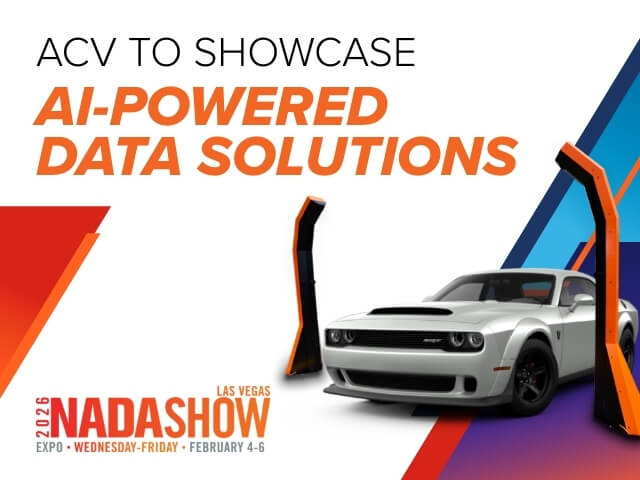ACV facts & figures

Just 20 years ago, fully electric vehicles (EVs) were almost entirely unviable¹ from an economic and functional standpoint. Even as recently as a decade ago, as Tesla was producing some of the first popular electric vehicles with a range of over 100 miles, many people and institutions treated the vehicles with caution. Lack of access to quick and reliable charging held these EVs back.
Today, charging stations are widely available, with nearly two hundred thousand across the continent², leading to a proliferation of new EVs. It’s now feasible to take one well outside its range in a single trip, so charging speed is now a main consideration. However, charging speeds can be anything but transparent. It’s important for dealers to know the intricacies of what impacts charging speed and how it can be interpreted. It’s likely that the fastest charging electric cars will be best-sellers in the coming years.
Why Measuring Charging Speeds is a Challenge
Different Types of Chargers
It’s difficult for manufacturers to provide a standard measurement of charging speeds because there are three separate types of chargers that most EV owners will use throughout the car’s lifetime³.
- Level 1 chargers typically come standard with all EVs and allow a user to plug their vehicle directly into a standard 120V wall outlet. These charge slowly and often need eight or more hours to fully charge a car.
- Level 2 chargers require a special installation and plug into a 240V outlet, and they can charge a vehicle in approximately half the time.
- DC Fast chargers are the most powerful, and they are generally only available commercially, such as at gas and charging stations. Most manufacturers cite DC charging speeds in their advertising.
Fewer Industry-Standard Measurements
With gas cars, miles per gallon is the widely accepted and enforced measurement for a vehicle’s fuel economy. Gas stations also have strict regulations to ensure their machines dispense one gallon of gas accurately. However, the EV market has no requirements for measuring or notating charging speed. With no industry standard, manufacturers are left to choose the measurement tactic that makes their vehicles look best.
Some manufacturers report how long it takes to charge from empty to full, while others measure from 10% battery to 80%. Still others measure how many miles a vehicle can achieve per minute of charging. Unfortunately, none of these are perfect systems, and for now, it’s difficult to accurately compare one EV to another with any certainty. Most consumer publications will choose a consistent metric, like the miles gained per minute of charge while the battery is plugged in under peak conditions.
Fastest Charging EVs on the Market in 2025
GMC Hummer EV Pickup
350 kW peak charging, making it the fastest-charging electric vehicle on the market in the U.S.4

Lucid Air Grand Touring / Sapphire
314 kW at peak charging, adding 162 miles of range in 15 minutes when tested5

2025 Porsche Taycan
Up to 320kW and 10 to 80% in roughly 18 mins.6

Hyundai Ioniq 6
237kW at its peak, with 10 to 80% charge in roughly 18 minutes, plus one of the best for efficiency of miles gained per minute.7

Kia EV6 GT
232kW at peak, charges around 50 miles in 7 minutes.8
Prepare Your Dealership Lot for the EV Market
As electric vehicle technology expands, you can expect them to turn up in the used car market in the future. The ACV Auctions platform lets you build a list of cars to watch for, so you can bid as soon as they become available. Our market reports help you stay current on a car’s condition and pricing. Sign up today to stay on top of the used car market and find the vehicles your customers want.
Sources
1. Energy.gov (15 September 2014). The History of the Electric Car. U.S. Department of Energy. Retrieved February 2, 2023, from https://www.energy.gov/articles/history-electric-car
2.US Department of Energy. “Alternative Fuels Data Center.” US Department of Energy. Retrieved September 2, 2025. https://afdc.energy.gov/stations/states
3. Duke Energy. Electric car charging is easier than you think. Duke Energy. Retrieved February 2, 2023, from https://www.duke-energy.com/energy-education/electric-vehicles/charging-your-ev/types-of-chargers
4. Seabaugh, Christian. 2022. “The Fastest-Charging Electric Vehicles You Can Buy New Today.” MotorTrend. Retrieved September 2, 2025. https://www.motortrend.com/features/fastest-charging-electric-vehicles-evs-car-truck-suv
5. Hoffman, Connor. 2022. “2022 Lucid Air Dream Charges More Quickly Than Any Other EV.” Car and Driver. Retrieved September 2, 2025. https://www.caranddriver.com/news/a39502213/2022-lucid-air-dream-performance-charging-test/
6. Kane, Mark. 2024. “2025 Porsche Taycan Pricing, Specs Overview.” Inside EVs. Retrieved September 2, 2025. https://insideevs.com/news/713724/2025-porsche-taycan-pricing-specs-overview/
7.Ayapana, Erick. 2023. “The 10 Fastest-Charging EVs We Tested in 2023.” Motor Trend. Retrieved September 2, 2025. https://www.motortrend.com/features/fastest-charging-evs
8. Fitzgerald, Jack. 2025. “EV Charging Test: Chevy Silverado EV Is Fastest, Toyota bZ4X Is Slowest.” Car and driver. Retrieved September 2, 2205. https://www.caranddriver.com/news/g46011090/fastest-slowest-ev-charging-times-tested/












